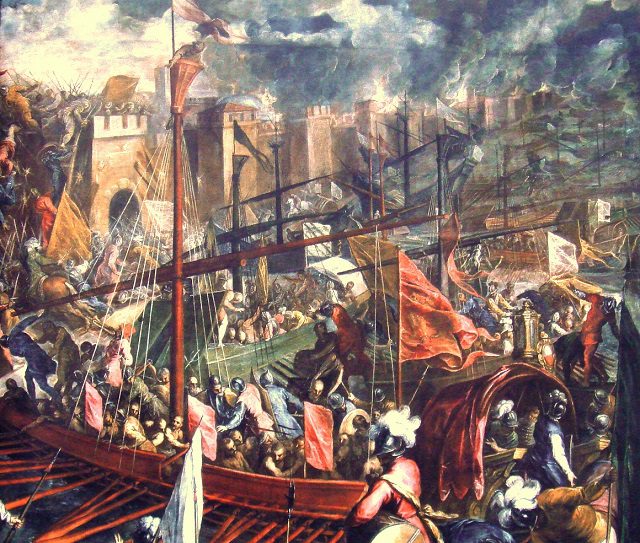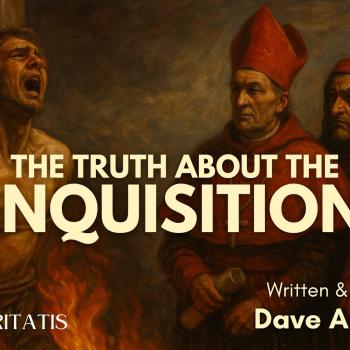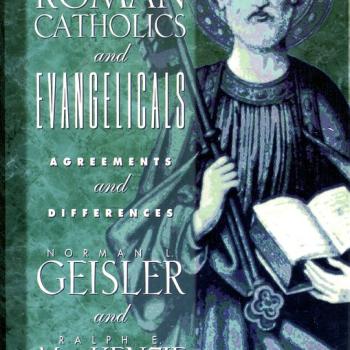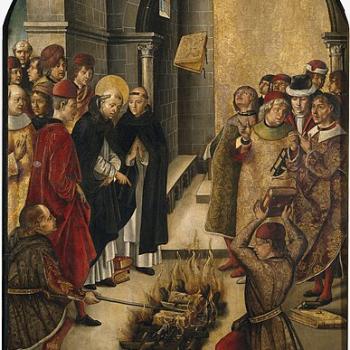
The Taking of Constantinople: 1204, by Palma Giovane (1544-1628) [public domain / Wikimedia Commons]
***
(1998)
*****
With reluctance, sadness, and regret, Catholics must forthrightly address the issue of the sacking of Constantinople, the capital of the Byzantine Empire (hence the center of Orthodoxy), in 1204 by the Latin Crusaders. Ideally, the numerous historical sins which members of both sides have committed – given the mutual acknowledgement of wrongdoing – should be left, for the sake of unity and good will, for the historians to mull over. Yet this incident was so tragic and has ever since been recalled with such pain and anger amongst Orthodox (and hence used as an “argument” against the Catholic Church) that it simply cannot be ignored even in the context of friendly ecumenical discussion. Bishop Kallistos Ware comments:
Eastern Christendom has never forgotten those three appalling days of pillage . . . What shocked the Greeks more than anything was the wanton and systematic sacrilege of the Crusaders. How could men who had specially dedicated themselves to God’s service treat the things of God in such a way? As the Byzantines watched the Crusaders tear to pieces the altar and icon screen in the Church of the Holy Wisdom, and set prostitutes on the Patriarch’s throne, they must have felt that those who did such things were not Christians in the same sense as themselves . . .
Can we wonder if the Greeks after 1204 also looked on the Latins as profani? Christians in the west still do not realize how deep is the disgust and how lasting the horror with which Orthodox regard actions such as the sack of Constantinople by the Crusaders. (The Orthodox Church, New York: Penguin Books, revised 1980 edition, 69)
One would be hard-pressed to find a Catholic historian (or any Catholic who learns the details) who would defend what took place in this abominable, reprehensible catastrophe. Warren Carroll, one of the best orthodox Catholic historians of our time, candidly admits in his major series of volumes, A History of Christendom:
The sack that followed was one of the worst in all of history . . . No man, woman or child was safe from the ravagers. Robbery and rape were almost universal, mindless destruction widespread. Westerners . . . killed indiscriminately, without mercy or restraint . . . For this to have been done by crusaders – men actually wearing the Cross of Christ – was an ineffaceable disgrace . . . The Greeks never forgot the sack of Constantinople in 1204; its memory, more than anything else, has prevented the healing of the Greek schism from that day to this, despite several major efforts at reunion. (The Glory of Christendom, Front Royal, Virginia: Christendom Press, 1993, 157-158)
So the first thing to be noted is that this horrific event is morally indefensible, and that Catholics know and accept this. Secondly, and most importantly, the pope at the time, Pope Innocent III, neither knew about nor sanctioned in the least this massacre and sacrilegious pillage. In fact, he had forbidden the Crusaders, on pain of excommunication, to attack Byzantium, instructing the leader, Boniface of Montferrat, that: “The crusade must not attack Christians, but should proceed as quickly as possible to the Holy Land.” He only found out the full horror of what had happened more than eight months later, and wrote to Cardinal Peter Capuano, denouncing the sack in no uncertain terms:
These “soldiers of Christ” who should have turned their swords against the infidel have steeped them in Christian blood, sparing neither religion, nor age, nor sex . . . They stripped the altars of silver, violated the sanctuaries, robbed icons and crosses and relics . . . The Latins have given example only of perversity and works of darkness. No wonder the Greeks call them dogs!” (cited in Carroll, ibid., p. 158; from Mann, Popes of the Middle Ages, vol. 12,266-267)
Yet there had been several similar scandalous atrocities or unsavory, treacherous incidents which occurred before the sack, on the part of the Byzantines, which have not received their due attention. For the sake of fairness and historical objectivity (not polemics and controversy), we will review some of these. Warren Carroll notes:
Horrible and utterly indefensible as the sack was, it should in justice be remembered that it was not totally unprovoked; more than once (as in the massacre of 1182) the Greeks of Constantinople had treated the Latins there as they were now being treated . . . Historians who wax eloquent and indignant – with considerable reason – about the sack of Constantinople . . . rarely if ever mention the massacre of the westerners in Constantinople in 1182 . . . a nightmarish massacre of thousands [about 2000 Greeks were killed in Constantinople in 1204, according to secular historian Will Durant: The Age of Faith, New York: Simon & Schuster, 1950, p. 605], . . . in which the slaughterers spared neither women nor children, neither old nor sick, neither priest nor monk. Cardinal John, the Pope’s representative, was beheaded and his head was dragged through the streets at the tail of a dog; children were cut out of their mother’s wombs; bodies of dead Westerners were exhumed and abused; some 4,000 who escaped death were sold into slavery to the Turks. (Carroll, ibid., 157, 131)
Bishop Ware also honorably writes about the Orthodox share of the blame in these massacres:
Each . . . must look back at the past with sorrow and repentance. Both sides must in honesty acknowledge that they could and should have done more to prevent the schism. Both sides were guilty of mistakes on the human level. Orthodox, for example, must blame themselves for the pride and contempt with which during the Byzantine period they regarded the west; they must blame themselves for incidents such as the riot of 1182, when many Latin residents at Constantinople were massacred by the Byzantine populace. (Ware, ibid., 70)
Catholic historian Warren Carroll recalls two other lamentable Byzantine incidents:
In 1171, on the orders or at least with the tacit approval of the Byzantine government, thousands of Venetians in the Eastern empire had been killed, mutilated, or arrested and held for years in prison. (Carroll, ibid., 150)
[In 1188] Frederick Barbarossa . . . requested permission of the Eastern Emperor, Isaac II Angelus, for passage of his army through Byzantine dominions on the way to the Holy Land, and for the right to purchase food for his troops within them. Isaac said he agreed . . . but in fact Isaac was resolved to oppose the passage of the crusaders, and made contact with Saladin [the Muslim commander] to concert plans “to delay and destroy the German army.” About this “Byzantine treachery” there is no doubt; even the many modern Western historians sympathetic to Byzantium and hostile to the Crusades have to admit it [e.g., Emperor Isaac, in 1187, had written Saladin to congratulate him for his great achievement of re-taking Jerusalem from the Latin crusaders] . . .
[Frederick’s envoys, imprisoned for a time] returned to Frederick . . . with infuriating (and accurate) reports of the Byzantine alliance with Saladin, plans to destroy the crusading army as it crossed the Dardanelles, and the violent anti-Western attitude of Patriarch Dositheus of Constantinople, who had offered unconditional absolution to any Greek killing a Westerner. Frederick passed on this information to his son Henry, . . . to ask the Pope’s approval for a crusade against the Eastern Empire because of its treachery and dealings with the enemy. No Papal approval was given and Frederick soon thought better of the idea . . . Though a war against Christians was indubitably a perversion of the crusading ideal, Emperor Isaac’s acts against the crusaders had clearly been acts of war . . .
Everything that the Fourth Crusade later did to Christendom’s discredit, Frederick Barbarossa refused to do, though he was directly provoked as the leaders of the Fourth Crusade never were. The extent of Byzantine provocation of the Third Crusade is obvious from the sequence of events. It would be a long time before anyone in the West would trust them again. (Carroll, ibid., 130, 132-133)
In conclusion, it is altogether to be expected that certain adherents (real or supposed) of both parties in any massive, long-running dispute such as that between Eastern and Western Christianity, will be guilty of serious sin. It has been established that the indefensible sacking of Constantinople was not without previous precipitating events on the part of the Byzantines, scarcely any less evil or immoral. Thus, the “sin” or “corruption” argument (as with Catholicism and Protestantism) cuts both ways (as is always the case). As such, it ought to be discarded, and ecumenical discussions profitably confined to matters of theology, liturgy, ecclesiology and moral theology.
In any event, the sacking of Constantinople in no wise disproves Catholic theological or ecclesiological claims, especially in light of the fact that the pope at the time, Innocent III, forbade such military travesties against fellow Christians on pain of excommunication, and excoriated the perpetrators for their abominations. These renegade “crusaders” were simply not acting as Catholics, neither in the sense of Catholic moral teaching, nor in terms of any sanction of papal authority. To draw a modern analogy, if some nominally Orthodox Serbian soldiers had wantonly massacred or raped Bosnian Muslims (as indeed occurred), it would not be at all fair for Catholics to say that this reflects ill upon Orthodoxy per se.
Some Orthodox who object to the above presentation need to distinguish between “minimizing” and “explaining the background of.” They are different things. I would never contend that these events didn’t have an enormously negative effect on the Eastern Christian consciousness. To do so would be sheer stupidity. Many Orthodox, on the other hand, seem to think their side has never or rarely committed any atrocities against western Christians, which is patently false. Catholic-bashing is very fashionable: secularists, Protestants, and Orthodox alike indulge in it with impunity. I think it’s time that “the other side” (ours) was heard for a change.
There is abundant sin to point out anywhere one looks. I say it has nothing to do with the bottom-line issues of which party more truly represents and embodies the apostolic Church. This doesn’t disprove the institution of the papacy, or overthrow biblical proofs for same, or resolve the filioque question, or the relationship of faith and reason, or the other bones of contention.
I am basically arguing an “immoral equivalency” (all men being burdened by original sin), not that the Orthodox were worse. That is not the same as saying that the sack of Constantinople was better or worse than anything else. Even if it were the worse sin ever committed by a so-called Christian army in history (which wouldn’t surprise me), that – in my mind – has nothing to do with the relative claims of Orthodoxy and Catholicism. Nor would it prove that Catholics are “bad guys” and Orthodox “good guys.” Such talk is kindergarten history and moral thinking.
I argue the same way vis-a-vis the 16th century events and Protestants, or concerning the Allies in World War II, or the North in the Civil War. This is my standard approach. Many Orthodox, on the other hand, casually assume that the West was worse historically. That said, I should point out that I am not very fond of the Crusades in general. It was a noble idea in theory which went radically and tragically wrong in practice (with a few notable exceptions). It is true, however, that the history of the Crusades has been distorted and abused, like virtually all history involving the Catholic Church at all (look at, e.g., the Spanish Civil War, where more than 3,000 clergy were massacred by the so-called “Republicans”, or secular accounts of Columbus, or the “Black Legend” of Spain).
I am happy to acknowledge Catholic sins. Our Church has made various statements. The recent one about the Holocaust comes to mind. Many Jews also forget all the Catholic and Protestant and Orthodox martyrs to the Nazis, and continue to slander Pope Pius XII, who saved (by Jewish estimates) 800,000 Jewish lives. Why are Orthodox too often reluctant to recognize similar Orthodox sins?
To repeat: this material is offered as an attempt to “balance the scales.” This is one of those events which is habitually presented in a one-sided fashion: all against the Catholic Church, and not a word about Orthodox sins. But events do not happen in an historical vacuum. As with my materials on “Protestant Intolerance and Persecution,” I seek to show that there are often no “good guys” to be found when we are considering the tragic events of history. A view which holds that either the Orthodox or Protestants were and are significantly morally superior to Catholics (either personally or institutionally) is absurd and farcical, and I consider this self-evident. As Solzhenitsyn (the Orthodox – albeit nominal – that I admire most) said, the line between good and evil runs through each individual’s heart.
Why the perpetual one-sided presentations? I suspect because they are a convenient club to beat us over the head with. This is an old tactic: ignore what the Church and the facts of history say on any given scandal or atrocity, and also ignore the similar skeletons in one’s own closet. My view – again – is simply to maintain that sin is universal, and that it proves nothing one way or the other as to who possesses true doctrine and theology. It is when sin is institutionally sanctioned that I personally draw the line and make my choice as to what body preserves apostolic and traditional Christian morality.
It is noteworthy in this regard that the massacres of Venetians in 1171 were perpetrated, according to Carroll, “on the orders or at least with the tacit approval of the Byzantine government.” The treachery of 1188 against Frederick Barbarossa and the Crusaders, by Eastern Emperor Isaac II, was obviously (by definition) from a position of high authority also (as the Byzantine Emperor was by nature also a leader in the Orthodox Church). Frederick asked the pope for approval for a crusade against Isaac but was turned down by the pope and soon thought better of it. Likewise, Patriarch Dositheus of Constantinople offered unconditional absolution to any Greek killing a westerner.
In other words, the Orthodox sins of this period against Latins were perhaps more serious, since they were authorized from the highest authority – hence institutionalized, whereas the pope in no way, shape or form sanctioned the sack of 1204. It comes down to the same old tragic flaw of caesaro-papism – precisely where the papacy differs from the Eastern outlook, since it transcends all human governments, rather than being co-opted and bought – so to speak – by them.
But when all is said and done, I see no point in adding up bodies for both sides. The point is that there is enough sin to go around, and the whole thing should be dropped, in my opinion, for the sake of unity. Both sides have acknowledged wrongs and it is time to move ahead. We can’t change the past.
I refuse to view the horrible event of 1204 in isolation, because that is the truly biased and unbalanced (even bordering on infantile) method of reading history, and mitigates against learning from its lessons. It is a fundamentally liberal mindset which never looks back at history to learn (and speculate) why things happened the way they did – why we are in the boat we are in now. The fact remains that 1204 was not sanctioned from the top, whereas Eastern massacres and treachery in 1171, 1182, and 1188 were.To me, that is the cogent point in all this trading of horror stories, because it illustrates the difference in the integrity and principle of authority between the two camps at the highest levels.
I wonder why this incident is always brought up amongst Orthodox? What is the purpose of that? To prove the Catholic Church is evil? I think that’s ludicrous. If it does not prove the evil nature of the Western Church, then of what use is it to constantly talk about this, when no one in their right mind (knowing the facts) defends it? I would never have written about either Orthodox or Protestant atrocities and unsavory incidents (as I prefer the proactive, positive approach) if my separated brethren had not bandied Catholic “historical sins” about with great disdain (and too often, glee). Once that is done, then I must “balance the historical record,” just as (to use an analogy from politics) Rush Limbaugh gives the antidote to pervasive leftist bias in the media. It’s always an uphill battle for us Catholics, because we labor under this avalanche of misinformation and emotional hostility.
The sad fact is, that the sack of 1204 is brought up far too often, and I don’t think that is conducive to the desired goals of unity and ecumenism (especially once all the facts about it and its precipitating causes are understood). If we can hold a 795-year-old grudge, why not go further back? Let’s hold a grudge against the Egyptians for enslaving Moses and the Hebrews back in 1400 BC or so. Let’s begrudge Italy because the Romans sacked Jerusalem in 70 AD. Let’s get mad at Greece (Macedonia?) for Alexander the Great’s many conquests. If time has no bearing on sin, then why not do that? The Serbians remember their battle of 1389 like yesterday, we are told, so why not 1204, too? Even secular society does better at forgetting than that. Look at our friendly attitude towards the Germans and Japanese, for example – a mere 50 years after they were both our mortal enemies in the greatest war of world history. Can’t the Church do a little better than that?
[name] wrote in message . . .
I cannot think of any incident in history in which Orthodox have invaded Roman Catholic territories and done anything even remotely like the atrocities committed by Roman Catholics in the East during the crusades.
Oh, I can. In May of 536, the Byzantine Army of Belisarius laid siege to, captured, and sacked Naples:
Belisarius had warned the Neapolitans at the beginning of the siege that if they put up any resistance he would be unable to restrain his army–which, he reminded them, was largely composed of semi-savage barbarians–from the murder, rapine and pillage which they would consider their just reward after the capture of the city. But the warning had been ignored, and the miserable citizens now paid the price of their heroism. It was many hours before Belisarius was able to persuade his motley hordes of Alans and Isaurians, Herulians and Huns–these last the most terrifying of all time, being pagans, they had no compunction in burning down the churches in which their intended victims had sought asylum–to put up their swords and spears and return to their various camps.
(J. J. Norwich, Byzantium: The Early Centuries [1989], p. 216)
* * *
(1) I was responding to a specific claim that nowhere were Orthodox persecuting Catholics. Not only did I present such an example, I provided specific evidence which, frankly, is so very rare on the Internet.
(2) The Catholic Church is persecuting Orthodox in Russia or the Balkans today? If anything it is the other way around. The Russian Federation’s new law on religious organizations is highly unfavorable to the Catholic Church. And Serbian atrocities in the Balkans are well documented–although Patriarch Pavle, e.g., has been a voice of peace and reconciliation.
(3) A “millennium of malice” is a bit too vague. There no doubt have been crimes committed against Eastern Christians by Latins–the sack of Constantinople (1204), in 16/c Poland, the Balkans during WW II. Likewise, the Easterners have persecuted Catholics throughout the Russian Empire from the 18/c-early 20/c, followed by the forced liquidation and bloody persecution of the Greek Catholic churches of Russia, Ukraine, Czechoslovakia, and Romania by the Communists with whom the Orthodox collaborated, as well as continual intrigues (in alliance with the Turks) against Catholics in the Middle East and centuries of anti-Catholic action in the Balkans (on this last, little told history, see Ivo Omrcanin, Forced Conversions of Croatians to the Serbian Faith in History – Paper Presented to the III World Congress for Soviet and East European Studies, Washington, D.C., 1985). None of which is to say I excuse anti-Eastern actions. I approach the East in a spirit of penance and forgiveness. I just hope for some reciprocity–which, I am afraid, is too little forthcoming.
(4) There are millions of Roman Catholics and the descendants of Roman Catholics throughout Russia (e.g., the Volga Germans, a forgotten group of Stalin’s victims), who are without pastors and proper ecclesiastical support. They too need spiritual medicine. Surely you don’t deny the Catholic Church the right to shepherd those souls?
(5) The Roman authorities have bent over backwards to accommodate Moscow with regard to the Ukraine. The Ukrainian Catholics, though, have legitimate grievances which have not even begun to be addressed. When Orthodox, who have yet even to distance themselves from their collaboration with Stalin, let alone apologize for it, complain about Ukrainian Catholics using self-help to reclaim their property, it is no surprise that those complaints fall on deaf ears.
(6) You may also be unaware of the many aid projects that Catholics have sponsored precisely for the assistance of the Russian (and other) Orthodox churches. Aid to the Church in Need, e.g., has proposed a program of providing direct aid to the clergy of Russia, in effect a supplemental monthly pension. The Catholic Near East Welfare Assocation has, I believe, provided funds for the renovation of churches and other projects. Caritas has done similarly. So far, the only thanks I’ve seen for such initiatives is continued suspicion.
(7) It is interesting to read that the original Serbians were of the Latin rite and within Roman jurisdiction. Byzantine chicanery took them out of that, though. Crimes by Serbians against the Croatians far predate the reverse.
(8) The crusades were launched, in part, in an effort to liberate and defend Eastern Christians from the infidels. It is too little remarked upon how the crusading ideal, with the idea of defending the Holy Places and Eastern Christians, shaped the Western tradition, really up till the 19/c.
(9) I also note that no one responded to the fact which I pointed out, namely that the first East-West aggression was that of the Byzantines during Justinian’s reconquest of Italy. I don’t really expect anyone to apologize for that. But it is good to understand our history.













